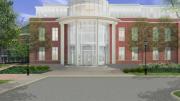The Harvard Business School (HBS) broke ground for the Ruth Mulan Chu Chao Center on April 24. The executive-education center, scheduled for completion in 2016, is the first building on the school’s campus named for a woman, as well as the first whose namesake is of Chinese descent. The edifice will house meeting rooms, office and dining facilities, and classrooms on the site of HBS’s Kresge Hall, currently undergoing demolition.
The building will be constructed in part with a $40-million gift from the Dr. James Si-Cheng Chao and Family Foundation. The Chao family, which honors its matriarch with the donation, made its gift in 2012. They also established the Ruth Mulan Chu and James S. C. Chao Family Fellowship to assist students with financial needs. About 10,000 executives attend programs at HBS annually, and the Chao Center will become a gateway for these students. The family itself includes an impressive share of HBS students, as the first to count four daughters as alumnae: the Honorable Elaine Chao, M.B.A. ’79, Secretary of Labor under George W. Bush; Grace Chao, M.B.A. ’78; May Chao, M.B.A. ’85; and Angela Chao ’95, M.B.A. ’01.
Fourteen white hardhats, emblazoned in crimson with the acronym HBS and the words Chao Center, and 14 gleaming new shovels awaited the groundbreakers. But first there was some speechmaking, led by HBS dean Nitin Nohria, who noted that “family, education, and service are core values of the Chao family.” He highlighted the new building’s importance, stressing the fact that HBS is the “only true residential campus at a major business school.” Next came President Drew Faust, who observed that there was significance in the fact that Ruth Mulan Chu had been “named after a heroine of Chinese folklore,” and was something of a heroine in her own right. The fact that the following generation had produced six daughters, four of whom attended HBS, was, Faust said, “a representation of the power of women in this family.”
U.S. senator Ed Markey (D-Mass.) was next to the rostrum. Addressing colleague and Senator minority leader Mitch McConnell (R-Ky.), Elaine Chao’s spouse, Markey said, “It is wonderful to see you.” After recounting how his own mother had once told him she would donate his brain to Harvard as an example of “a completely unused human organ,” he described the Chao family story—which involved emigration from China followed by rousing success in the United States—as “a uniquely American experience.” Addressing Dr. James S.C. Chao, founder and chairman of Foremost Group, Markey declared that “Horatio Alger would never have had the nerve to write your story.” Cui Tiankai, China’s ambassador to the United States, followed. He said that the Chao Center would “inspire young people from all nations of the world,” and added, “We need facilities like the Chao Center to enable efforts for better understanding between people.”
Former prime minister of Australia Kevin Rudd, now a fellow at the Harvard Kennedy School, rose next and referenced his 35 years of studying China and spending time with Chinese families there. He spoke of a pattern of “adversity becoming opportunity becoming philanthropy” that applied to the Chao clan. He also praised “the extraordinary contribution of Chinese citizens and culture to the world at large.” After mentioning the “Chinese dream” (the term popularized by new General Secretary of the Communist Party Xi Jinping as shorthand for his agenda) and the American dream, Rudd speculated that some day, “China and America might begin to dream together.”
Elaine Chao completed the speechmaking, with several of her sisters standing behind her on the podium. She lauded her mother, the namesake of the new center, as someone whose “love of learning was a key factor in our lives.” She expressed gratitude that her family had “proved to be the beneficiaries of two cultures”—Chinese and American. She noted that her parents “didn’t set out to make money.” Instead, their guiding premise was that “it is each person’s responsibility to do their best at each task in life.” She envisioned the international group of students who would soon throng through the Chao Center as people who would, among other things share “best practices,” adding that “we need to create leaders of integrity and conscience. It is more important than ever to create global leaders.”
Then they broke out the hardhats and shovels.









